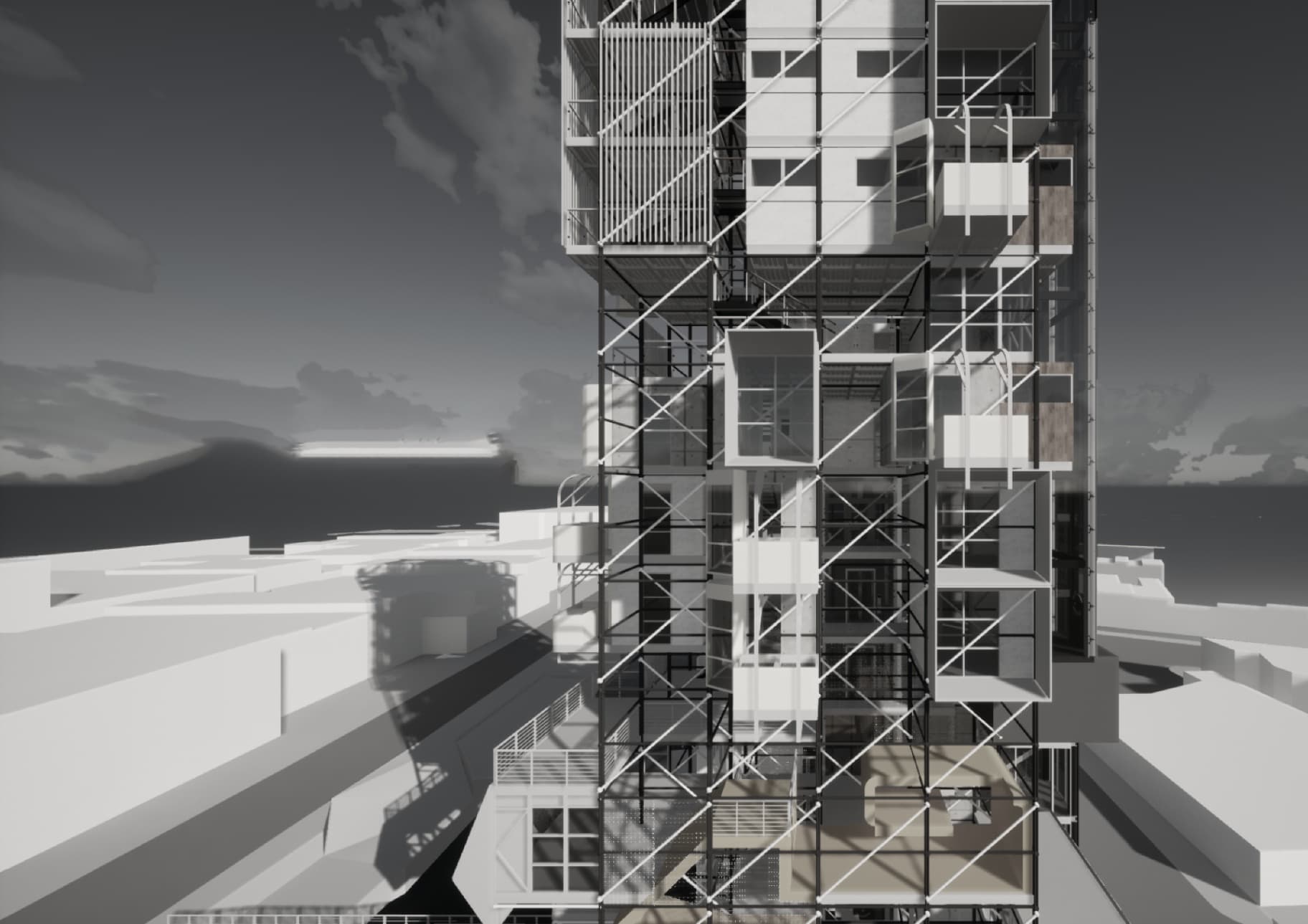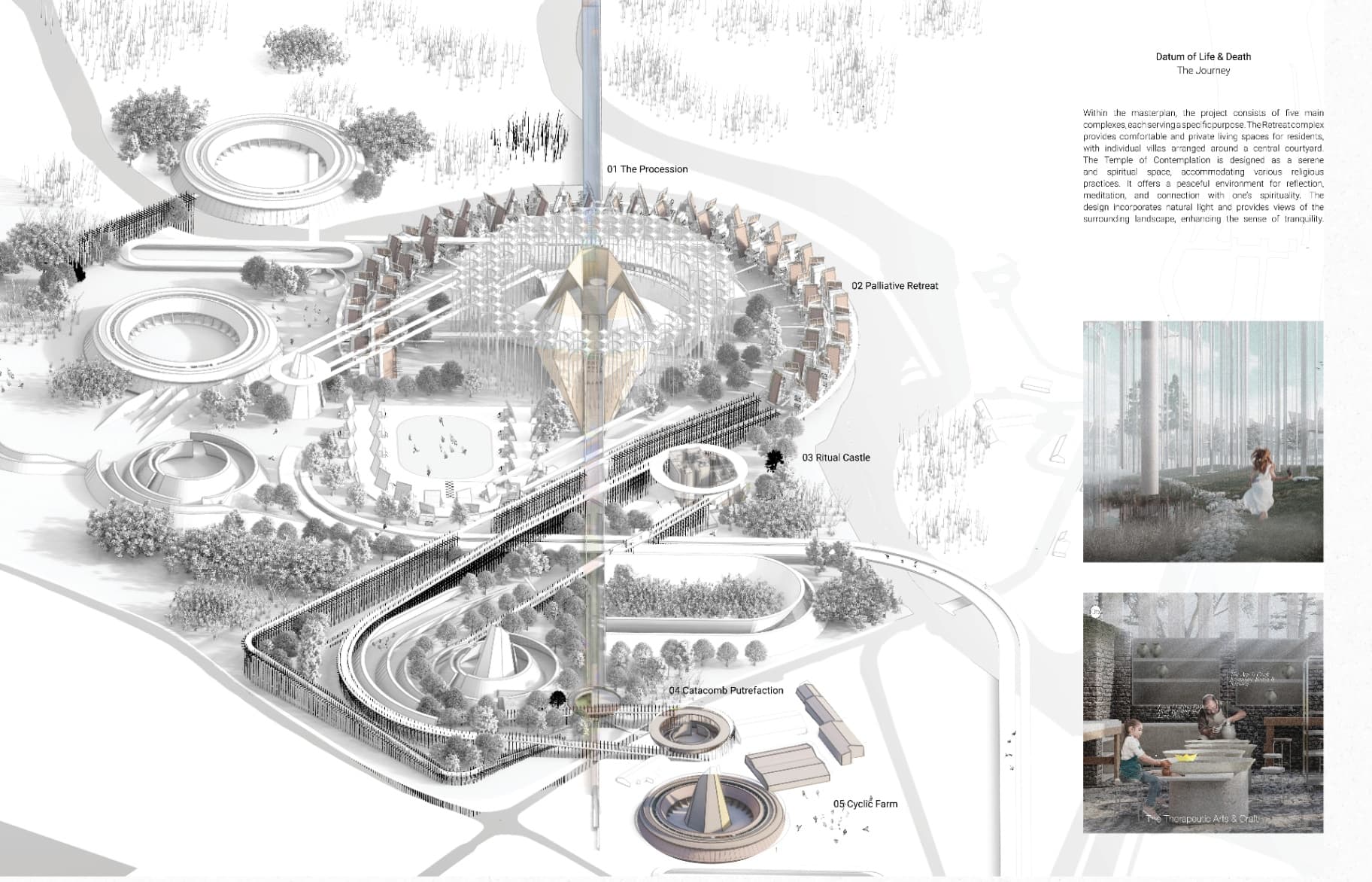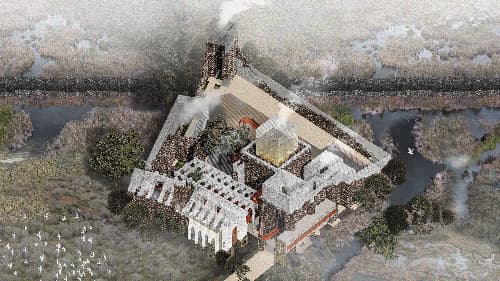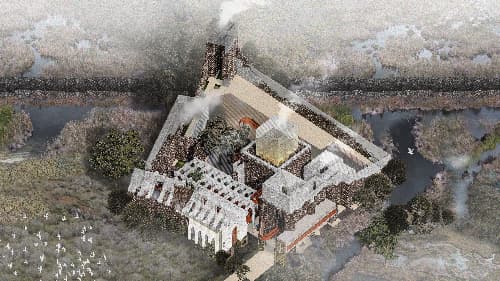

The Scaff 'A Modular and Rapid-Adaptation Housing Solution for North Sea Offshore Workers'
In response to the limited presence of skill and training in the Grimsby town center and the unique temporal nature of the offshore labor force in the North Sea region, this project aims to propose and design a modular and systematic housing scheme. This innovative approach utilizes prefabricated construction methods that are easily assembled and repurposed to meet the dynamic needs of offshore workers, including those in the oil and gas, fishing, and wind energy industries Modular and Rapid-Adaptation Housing: The central goal is to provide transient housing for offshore workers while considering the ever-changing nature of their presence and the materials and services required in the area. It challenge the conventional concept of "temporary" in housing policy by creating a system that can adapt rapidly to environmental and economic crises. Scaffolding City serves as a prototype for a metropolis rooted in human development history but embracing future forms of synthetic urbanism. Economically Minded Design: Scaffolding City encourages resource-consciousness and economic sustainability. By maintaining low material costs and fostering a system open to novel applications and techniques, individuals are empowered to reinterpret materials and establish secondary and tertiary economies around material transfer and transformation. This approach supports a thriving local economy while minimizing environmental impact. Connective and Adaptive Urban Planning: Rather than relying on rigid urban planning, Scaffolding City's development strategy is guided by access to resources, local economic conditions, and environmental factors. This adaptable urban model prioritizes connectivity and proximity to resources, allowing it to evolve organically. Scaffolding City can be described as a mobile and customizable planning system that can be moved from site to location, making it a versatile solution for diverse environments and needs. Conclusion: Scaffolding City represents a visionary response to the housing needs of offshore workers along the North Sea coast. This innovative housing solution combines modular design, rapid adaptation, and economic sustainability to create a dynamic and resilient urban environment. By incorporating the principles of "Icelandic Lessons" and embracing the concept of Scaffolding City, we aim to provide a model that not only meets the immediate requirements of offshore labor forces but also contributes to the long-term development of the region.

The Last Vacation 'The Story of Journey and Death'
In collaboration with Arif Ismail, our project delves into the concept of the "human demise." We aim to develop a new procedure that harnesses the resources and energy generated from a human's death while exploring an alternative where these resources and energy form the foundation of a new architectural dimension within the Cumbria region, specifically in Penrith. Through this endeavor, we seek to create innovative building materials and expand the possibilities of constructing structures. We explored a holistic approach by not solely focusing on the physical infrastructure and operational systems of the premises. It delves deeply into the intricate nuances of human behavior, acknowledging the significance of spatial qualities, lighting, emotions, and cultural backgrounds that are inherently intertwined with the experiences surrounding funerals and death. Moreover, the project is keenly aware of the profound emotions and personal connections associated with funeral rituals and the concept of death. Cultural backgrounds, traditions, and beliefs are thoughtfully integrated into the design and implementation processes. By honoring and respecting diverse cultural perspectives, the project aims to create spaces that resonate with individuals from different backgrounds, fostering inclusivity and understanding. By deeply considering these human behavioral aspects and plug it into the designated infrastructure system, the project strives to create an environment that goes beyond mere functionality. It seeks to provide a profound and meaningful experience for individuals navigating the challenging and sensitive moments associated with funerals and the overall concept of death.

"EMBODIED" The Last Vacation
In this project, working pair with Arif Izzudidin Arif Ismail we explore the idea of "human dead," creating a process of a human going to end his life, which produces sources and energy from the death, and in an alternate timeline, creating a new starting dimension of constructing a building, which is started from sources and energy. They can create a building material and an extension of a building.

"EMBODIED" The Last Vacation
In this project, working pair with Arif Izzuddin Arif Ismail we explore the idea of "human dead," creating a process of a human going to end his life, which produces sources and energy from the death, and in an alternate timeline, creating a new starting dimension of constructing a building, which is started from sources and energy. They can create a building material and an extension of a building.